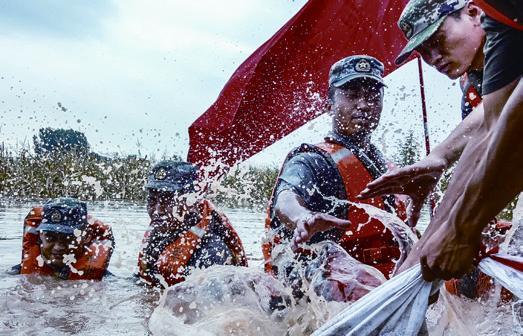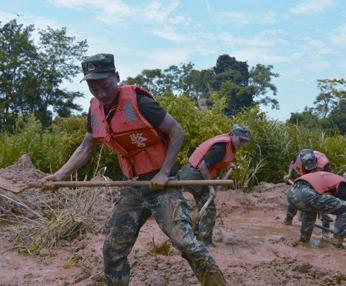UNITED AS ONE
2020-08-06ByWangHairong
By Wang Hairong

In a muddy field close to Poyang Lake, Chinas largest freshwater lake in the eastern province of Jiangxi, a squad of armed police officers were digging a drainage ditch under the scorching sun on July 18. Among them was Luo Jie, member of an armed police detachment in Fuzhou, Jiangxi, wearing an orange life jacket over a black T-shirt and mud-covered trousers.
Since torrential rain battered the area on the middle reaches of the Yangtze River in early July, Luo has carried out various tasks to fight the floods.
The Yangtze River basin has been drenched by record rainfall in half a century. On July 9, after receiving orders from the detachment command, Luos unit dashed to Daifang Town, Lean County, to carry out search and rescue mission. Pounded by heavy rain for days, the town was flooded. Using a speedboat, Luo and his fellow soldiers searched door to door. After spotting three trapped persons, they immediately transported them to a safe place.
Then they went to nearby Yugan County to reinforce a levee. On July 10, a flood patrol spotted a crack on the slope of the embankment, and the stand-by rescue teams began fixing the problem.
More than 4,000 people, including the armed police officers, worked around the clock for four days to remove the danger, using 2,200 cubic meters of pebbles to reinforce the dike and control seepage, according to the local government. As a result, the life and property of about 55,000 people have been protected.
“Floods are deep in my memory,” Luo said, “In 1998, I saw my home in the central province of Hunan basically washed away by floodwater.” At that time, Luo, 6, his brother, 8, and his mother were trapped by flood.Several soldiers in camouflage uniform rushed to their rescue and sent them to a resettlement site, Luo told Xinhua News Agency.
In 1998, severe flooding ravaged provinces along the middle and lower reaches of the Yangtze and some areas in northeast China, killing more than 3,000 people and inundating over 20 million hectares of fields, according to official statistics. The military raced to save lives and protect embankments. Filled with gratitude and admiration, Luo joined the army in 2014.
Sweat and toil
While Luos unit participated in disaster relief in Jiangxi, some soldiers of the 72nd Group Army of the Peoples Liberation Army (PLA) were taming the floods in neighboring Anhui Province.On July 22, when a section of a dike in Lujiang County breached, 28 members of a commando team of the army tied ropes around their waists to form a human wall to help people evacuate. As the breach suddenly expanded, ferocious and turbid water swept five soldiers away. Fortunately, all of them were rescued. One of them, Mao Xiaochi, went into coma and required treatment in the intensive care unit.
Military personnel also helped local residents to rebuild their life after the floods. Shexian County in Anhui was flooded on July 7. Hundreds of businesses in the countys economic development zone were affected. In a tea companys workshop, hundreds of bags of semi-finished products were soaked in water and covered with sludge. It was estimated the flooding affected about 3,000 tons of tea worth 90 million yuan ($12.86 million). A video clip posted online showed the owner crying at the factory gate due to the loss.
When the local armed police detachment learned of this, it sent officers to help clean up the mess and sanitize the factory. They disposed of the ruined tea and dried the slightly moist tea, putting the factory back in order.
Equipment and expertise
The military not only sent personnel but also equipment and technology to fight the floods. More than 40,000 military personnel, including PLA officers and soldiers, armed police force and militias, participated in flood control in Jiangsu, Zhejiang, Anhui and Jiangxi provinces along the middle and lower reaches of the Yangtze, reported China Central Television on July 20. They brought 321 boats, 78 construction machines and nearly 2,800 vehicles.
A reconnaissance unit of the PLA 73rd Group Army scanned a levee with infrared surveillance equipment installed on an unmanned aerial vehicle and found a bubble spring hidden under reeds. The officers calculated the earthwork required for a cofferdam and plugging, and worked out a treatment plan before the emergency team arrived. The military rescuers used heavy equipment and highly cohesive sandy soil and other materials for efficient plugging.
In addition to life jackets, the officers and soldiers on the rescue missions wore an inflatable life belt 5 centimeters wide. When a person falling into water opens the inflation valve, high-pressure gas is released to fill the air bag and turn the belt into a lifebuoy around the waist. This equipment makes it safer for rescuers to carry out missions in water.
Sweet appreciation
On July 14, a PLA unit dispatched to control the floods in Wuwei, Anhui, received a special letter attached to a bag of candies. It was from 10-year-old Xu Junyi, who lives in the city close to the Yangtze. More than 500 PLA officers and soldiers were stationed in the city to prevent and control flood. When the boy saw images of their hands and feet wrinkled after being in water for a long time, he was touched and wanted to cheer them up. He bought the candies with his pocket money, and sent the letter to the units temporary camp. “Thank you for your hard work,” he wrote.
PLA troops in Anhui also received 50 laundry driers donated by a research institute in the provincial capital of Hefei. On July 26, when the Red Cross Society of Hefei learned that the soldiers clothes could not be dried in time, it solicited donors and the institute immediately responded. The next afternoon, all of the donated driers were delivered and put into service.
On July 15, on a dike in Poyang County, 64-year-old local resident Zhu Aixiang and other women brought tremella soup and other heatstroke-preventing food, mineral water and watermelons to the military rescuers who were reinforcing the embankment. “I hope they eat more and gain more strength, because the work is hard,” she told China News Service.
“Most of them are as young as my grandson. My heart aches to watch them sleep by the dike every day,” Zhu said. So she and her friends decided to do something for the soldiers.
“The villagers are very warm-hearted. They give us more strength,” a soldier named Pan Zhaoxi said.
